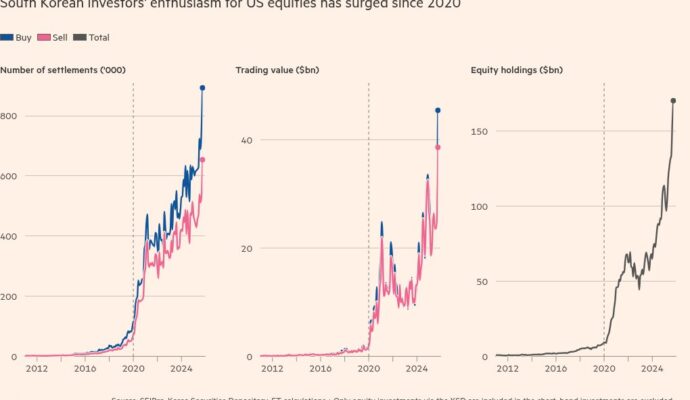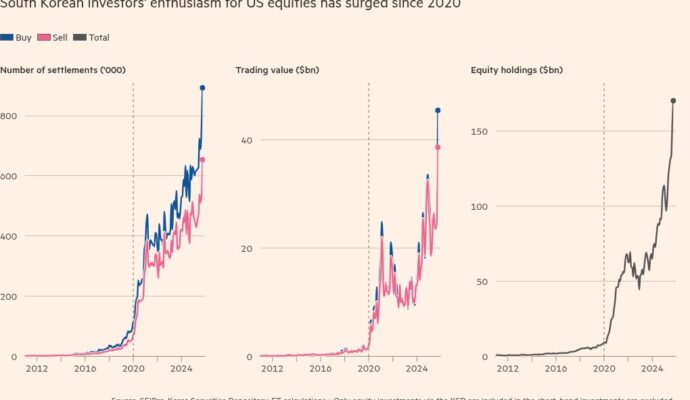Unlock the Editor’s Digest for free
Roula Khalaf, Editor of the FT, selects her favourite stories in this weekly newsletter.
The head of Warren Buffett-backed Marubeni has said it is “no longer a trading company” as tariffs accelerate the Japanese group’s shift towards investments that are insulated from global trade.
Masayuki Omoto, who became chief executive of the Japanese trading house in April, said a long-term shift towards a polarised global order, driven by US President Donald Trump’s tariffs, would lead to an even stronger focus on businesses that operated within individual countries and regions.
“We are no longer a trading company,” he told the Financial Times. “Most of our businesses are actually businesses inside each country.”
The investment strategy represents a shift for Marubeni. Founded as a linen trader in 1858, it played a central role in Japan’s postwar economic revival by securing resources through investments in fossil fuel projects, mines and port infrastructure while marketing the nation’s manufactured goods in global markets.
Like Japan’s other trading houses, Marubeni later stepped outside resources to invest in assets that often lacked clear synergies with trading activities, in sectors ranging from aircraft leasing and used-car sales financing to leather clothing manufacturing and meat production.
The industry-wide shift was further spurred by losses from a commodity price slump in 2015. Marubeni retrenched from grain trading in 2022 with the $3bn sale of Gavilon, a botched acquisition from 2013 that led to a string of writedowns.
In the past five years, the portion of profits from non-resources sectors has risen across most of Japan’s sogo shosha. At Marubeni, it comprised 74 per cent of its adjusted net profit of ¥220bn ($1.4bn) in the quarter to the end of September.
Investments include offshore wind farms and car dealers in the UK, a top-three automotive fleet management business in the US and the dominant tyre maintenance provider in Thailand.
“Whenever we start investing, we don’t ask a question whether or not this is incrementally helpful to our trading,” said Omoto.

Marubeni’s chief hopes to model its capital allocation strategy after those of Berkshire Hathaway, Hitachi and Danaher to reach a ¥10tn market capitalisation, up from ¥6.5tn at present, but admitted there was still a “gap” with those industrial conglomerates.
Dubbed a “demon drill sergeant” by Marubeni’s chair, the 56-year-old Omoto breaks from tradition as the first trading house chief who is not a company lifer, having spent a year at McKinsey.
Berkshire lifted its stakes in Japan’s five biggest trading houses this year and said it expected to hold the investments for “many decades” after the companies agreed to relax a 10 per cent shareholding cap. The US conglomerate is Marubeni’s largest investor, with a 9.3 per cent stake.
Net profit in the six months to the end of September rose 28 per cent year on year to ¥305.5bn, in part due to valuation gains from the integration of Dai-ichi Life’s domestic real estate business, which was completed in July.
One area of concern among analysts is whether the Japanese government will call on the trading houses to implement its $550bn investment pledge to the US in return for tariffs being lowered to 15 per cent.
Omoto said the fund’s “sheer scale” created a “high hurdle” but dismissed the notion that the government would pressure trading houses to implement it, citing regulators’ decade-long push to improve corporate governance in the private sector.
“Anything that potentially involves the private side needs to make sense from a private company point of view,” he said.
Trump’s presidency had not dimmed Marubeni’s optimism for the US market, said Omoto, who called it the only developed economy that can “provide reasonable prospective growth” and added that Japanese companies were not at risk of over-concentrating investment in the country.


